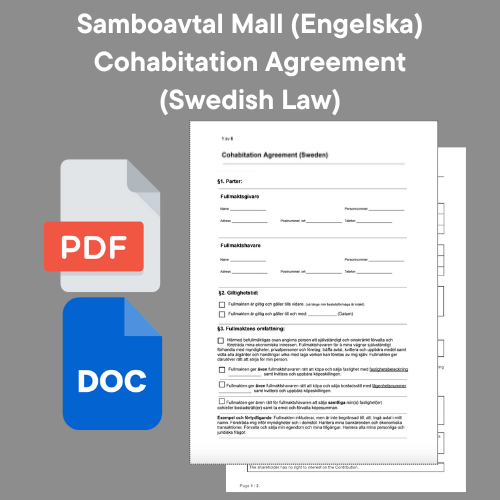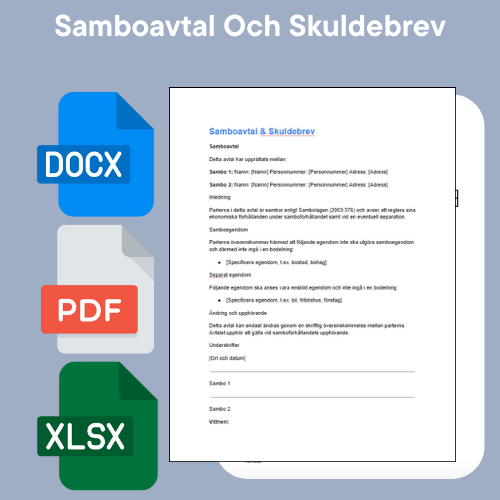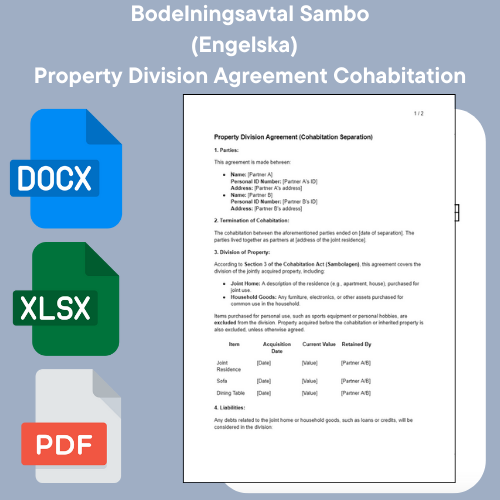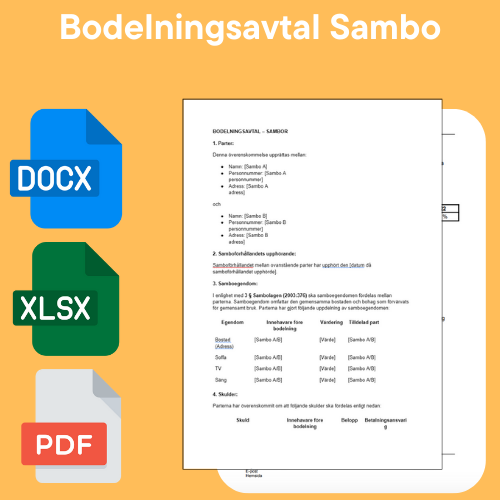Does the cohabitant become a joint owner of the estate?
Share
Table of contents
- What is a deceased estate owner?
- Cohabitant and inheritance rights – a complicated relationship
- Partnerships and division of property in case of death
- The importance of a will
- Form requirements for a valid will
- Cohabitation agreement and its meaning
- Spouse's right to survivor's pension
- Exceptions and special situations
- Legal help and document templates
- Conclusion
What is a deceased estate owner?
Before we dive into the specific rights of cohabitants, it is important to first understand what a cohabitant is. An estate co-owner is a person who, according to law, has the right to share in an estate, i.e. the deceased's assets and liabilities. In Sweden, the rights of the estate owners are regulated by the Inheritance Code, which is the law governing inheritance and wills.
Deceased co-owners can be heirs at law, legatees or sometimes surviving spouses. They have the right to participate in the administration of the estate and in some cases can also make decisions about how the assets are to be distributed.
Cohabitant and inheritance rights – a complicated relationship
A central point to understand regarding cohabitants and inheritance rights is that, according to Swedish law, cohabitants do not have automatic inheritance rights after each other. Unlike married couples, where the surviving spouse or partner has a statutory right to inherit, common-law partners have no such right. This means that if you and your partner have not made a will, your partner will not inherit from you.
This is a significant difference that can have serious consequences if not taken into account in time. If one of the spouses dies without a will, the deceased's assets will be distributed according to the statutory succession. This may mean that the inheritance goes to children, parents or other relatives, but not to the partner.
Partnerships and division of property in case of death
Partnerships regulate the relationship between cohabitants and provide certain rights in the event of separation or death. According to the Cohabitation Act, the surviving cohabitant has the right to request division of property upon the death of his partner, but this right only applies to joint housing and household goods, i.e. things acquired for joint use.
This means that if the cohabitant requests property division, the home and the property are divided equally between the surviving cohabitant and the deceased's heirs. However, other assets, such as money in the bank, shares, real estate or personal belongings that do not constitute joint property, are not covered by the rules of the Cohabitation Act and will go to the deceased's heirs according to the order of inheritance.
The importance of a will
In order for a partner to have the right to inherit the deceased, a will must be drawn up. In a will, the deceased can specify that the partner should inherit all or part of the assets. The will is a powerful legal tool that can ensure that the surviving partner is not left out of the inheritance.
Without a will, the partner can, despite having shared a life together, be left without an inheritance, which can create great financial uncertainty. It is therefore strongly recommended that cohabitants who want to protect each other financially in the event of death draw up a will.
Form requirements for a valid will
For a will to be legally binding, it must meet certain formal requirements. The will must be in writing and signed by the testator, that is, the person writing the will, in the presence of two witnesses who must also sign the document. The witnesses must not be heirs or legatees.
It is also important that the will is clear and leaves no room for interpretation. Ambiguities in the will can lead to it being questioned and the inheritance not being distributed according to the will of the testator. Therefore, it may be wise to use a professional document template or consult with a lawyer when drawing up the will.
Cohabitation agreement and its meaning
Another important document for cohabitants is a cohabitation agreement. A cohabitation agreement is a legally binding agreement between cohabitants that regulates how the assets are to be distributed in the event of separation or death. Unlike a will that regulates inheritance, a cohabitation agreement can stipulate that certain property is not to be covered by the Cohabitation Act's rules on property division.
For example, cohabitants can agree in a cohabitation agreement that the home or household property is not to be divided in the event of a separation or death, which provides greater flexibility and security in how the assets are distributed.
Spouse's right to survivor's pension
In addition to inheritance issues, the issue of survivor's pension can also be relevant for cohabitants. In Sweden, under certain circumstances, cohabitants are entitled to a survivor's pension if their partner dies. In order for the cohabitant to be entitled to a survivor's pension, it is required that the couple have or have had children together, or that the cohabitants have previously been married or had children together.
It is important that cohabitants are aware of these rules and ensure that their rights are secured, either by formally regulating the relationship or by ensuring that relevant documentation and agreements are in place.
Exceptions and special situations
There are also special situations where a cohabitant can become co-owner of the estate, for example if there are common children who inherit the entire estate. In such cases, the surviving partner can receive a certain part of the inheritance indirectly through the children. There may also be exceptions in situations where the cohabitant is a universal legatee and therefore shares in the entire estate.
Legal help and document templates
For many, it can be difficult to navigate among all the legal rules and requirements. Therefore, it may be a good idea to seek legal help or use reliable document templates to ensure that all necessary agreements and wills are properly drawn up. By using professional document templates, you can be sure that you meet all formal requirements and protect your partner's rights in the best possible way.
Conclusion
Cohabitants do not have the same rights as married couples when it comes to inheritance and inheritance rights. It is therefore of the utmost importance that cohabitants who want to protect each other in the event of death take active steps to ensure this by drawing up a will and possibly also a cohabitation agreement. Without these legal documents, the surviving partner may be without inheritance rights, which can create great financial difficulties in an already difficult time. By being prepared and using the right document templates, you can ensure that your partner receives the protection and rights that you desire.




